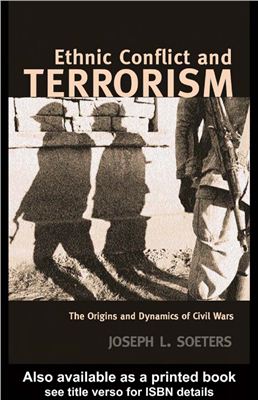Routledge, 2005. 144 p.
This book aims to understand the origin and dynamics of so-called intranational conflicts such as those that have been affecting Europe (Northe Ireland, the Basque Country region in Spain, Corsica in France, the former Yugosalvia and Albania), and a number of countries in the developing world (Rwanda, Liberia, Sierra Leone, Sudan and Uganda, Haiti, India, Pakistan and others) and how these conflicts have been invested by terrorist organisations at both national and inteational
levels.
To analyse their emergence and development, the book offers an introduction into nine basic mechanisms analysed and defined by social sciences disciplines such as sociology, anthropology, political sciences and social psychology, that are relevant to the understanding of these conflicts.
The nine themes are divided into two groups: long-term macro issues and short-term micro issues and each chapter analyses one of these mechanisms or themes. Ultimately this book defines a number of considerations aiming at the development of policies to prevent and stop such conflicts.
This book will be of interest to undergraduates and post-graduate students in conflict and terrorism studies.
Macro and long-term factors
Grid Characteristics and Group Boundaries
Waning Govement, Democratic Deficit and Strategic Constellation
Violence and (De)civilisation
Violence and Culture
Rationalisation of Evil
Micro and short-term factors
Group Binding, Stereotyping and Ideologising
Social Mobilisation and Leadership
Rising Expectations, Relative Deprivation and Reduction of Power Distance
The Dynamics of Conflict 1
Conclusions and Implications
This book aims to understand the origin and dynamics of so-called intranational conflicts such as those that have been affecting Europe (Northe Ireland, the Basque Country region in Spain, Corsica in France, the former Yugosalvia and Albania), and a number of countries in the developing world (Rwanda, Liberia, Sierra Leone, Sudan and Uganda, Haiti, India, Pakistan and others) and how these conflicts have been invested by terrorist organisations at both national and inteational
levels.
To analyse their emergence and development, the book offers an introduction into nine basic mechanisms analysed and defined by social sciences disciplines such as sociology, anthropology, political sciences and social psychology, that are relevant to the understanding of these conflicts.
The nine themes are divided into two groups: long-term macro issues and short-term micro issues and each chapter analyses one of these mechanisms or themes. Ultimately this book defines a number of considerations aiming at the development of policies to prevent and stop such conflicts.
This book will be of interest to undergraduates and post-graduate students in conflict and terrorism studies.
Macro and long-term factors
Grid Characteristics and Group Boundaries
Waning Govement, Democratic Deficit and Strategic Constellation
Violence and (De)civilisation
Violence and Culture
Rationalisation of Evil
Micro and short-term factors
Group Binding, Stereotyping and Ideologising
Social Mobilisation and Leadership
Rising Expectations, Relative Deprivation and Reduction of Power Distance
The Dynamics of Conflict 1
Conclusions and Implications

